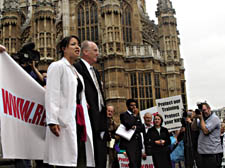|
|
 |
| |

Dr Judy King addressing a recent rally at Westminster |
Forming union could be in docs’ healthy interests
Doctors are ready to step into the political arena to fight recruitment reforms, writes Dr Judy King
THE saga of the junior doctors’ job application process has dragged on for months.
The system was beset with problems right from the start. Doctors generally prefer to stay out of the spotlight and do not think of themselves as a group who get involved in politics – usually they have enough to be getting on with. But something has happened this year to change all that.
This year, doctors led by Remedy UK have marched through London in their thousands, held a rally at Westminster, lobbied hundreds of MPs and taken the Department of Health to the High Court. So much for not getting involved in politics.
So why all the fuss? Are they whining because there is competition for jobs and they might not get what they want? Or is that just government spin? Are they really being treated appallingly after years of devotion to the NHS? And should you listen when they say that if you care about the NHS, you should also care about the calibre of the doctors within it?
First, doctors are no strangers to competition. Fierce competition for places starts at medical school, and only gets worse from there. But competition has to be open and fair, and this year it was anything but.
MTAS, the Medical Training Application System, was meant to increase efficiency by using a single, standardised application form that was filled in online. Although a good idea in theory, in practice the computer system repeatedly crashed, the security system was breached and the software failed, resulting in it finally being withdrawn completely. But not before the damage had been done.
The form itself has been open to widespread criticism. Instead of the usual emphasis on experience in medicine, higher degrees and medical research, the majority of the marks were given for ‘fluffy’ questions on how to deal with misunderstandings or stress at work.
The problem was that applicants could just make up the answers, or there are several websites that will write model answers for you. Whereas medical degrees, PhDs and other qualifications can be verified, there is no way of validating the answers on the ‘psychobabble’ questions. The result was that candidates with first-class Cambridge degrees and gold medals were not short-listed for anything.
Nor could unsuccessful applicants simply apply again in the future. This year also saw the introduction of ‘run-through training’ – successful applicants would continue on to become a consultant. However, because of the conveyor belt nature of the system, there is no easy way back on once the places have been filled. With 34,000 applying for 20,000 posts, that meant that thousands of doctors, trained at great expense to the taxpayer, were going to be left out, permanently.
Doctors were, this week, unsuccessful in their legal challenge to the process at the High Court. Although the system was found to be very unfair, it was not found to be unlawful. The opportunity to affect the current recruitment round looks to have passed, as the decision is not being appealed. Attention has turned to Sir John Tooke, who will head a review of the whole process. There are important lessons to be learned, and doctors have high hopes that he will prevent similar problems in future years.
And what of Remedy? Despite being disappointed by the High Court defeat, the message to the Government – that doctors will not stand idly by as reforms are rushed through to the detriment of the NHS – has gone out loud and clear.
In five months, five doctors and a doctor’s wife have organised a march attended by 12,000 doctors, a rally at Westminster and taken the Department of Health to court. Doctors are calling for them to form a new union.
What they decide to do remains to be seen, but watch this space.
|
 |
|
| |
|
 |
|